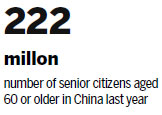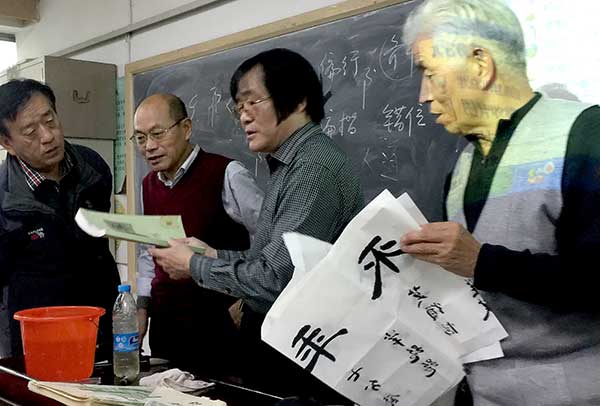College 'lottery' rankles elderly learners
|
Senior citizens talk during a calligraphy class at Hebei University for the Aged. Zhang Yu/China Daily |
Teng Junying has no idea what 2017 will hold if she fails to win a spot at Hebei University for the Aged, a government-funded school for senior citizens.
The 57-year-old has spent the past two years in the university's classrooms, learning to sing and dance, but she fears a change to its admissions policy could leave her disappointed.
"It feels like a lottery," she said, referring to the announcement that applications for its 4,000 places will now be decided at random.
The school, established in 1987 in Shijiazhuang, capital of Hebei province, previously operated on a first-come first-served basis, which resulted in long lines forming outside the admissions office.
"More people want to study at the school," said Li Lin, who works in the admissions office, especially as from next year, the school will waive all tuition fees, part of efforts to encourage more elderly citizens back into education.
The school has received more than 20,000 applications since the beginning of December, Li said. "The new selection method is to make sure each applicant has an equal chance."

Yet the news has Teng concerned. She has successfully been able to enroll for two consecutive years because she was willing to line up earlier than other applicants.
"Elderly people today are eager to learn new things, to enrich our mental health and to kill time after retirement," she said.
Teng retired at 50 years old and spent five years helping her daughter raise a child, which made her feel useful. "But my grandson no longer needs daily care, so I have a lot of time to kill."
Studying at the university, which offers 21 courses ranging from dancing to calligraphy and image design, "made me feel energetic and young", she said, adding that if she does not earn a place, she has no idea what she will do instead.
She is not alone. Lyu Pinghai, 60, who retired from his job as an engineer last month, submitted an application to the school on Wednesday. "I can't bear that I have nothing to do every day," he said.
Although education institutes for the elderly have developed over the past 30 years or so, with at now least one in every county and city, demand still exceeds supply, said Lyu Bingxing, vice-president of the Hebei college.
"Development needs to catch up with the rapid rate of aging in our population," he said.
China had 222 million people aged 60 or older in 2015, accounting for 16 percent of the population, according to an education development plan for senior citizens released by the State Council in October. The number is forecast to reach 243 million in 2020.
Currently, 3.2 percent of elderly people, more than 7 million, are studying at schools or other institutions. The plan sets a target to increase that to 20 percent within five years.

























